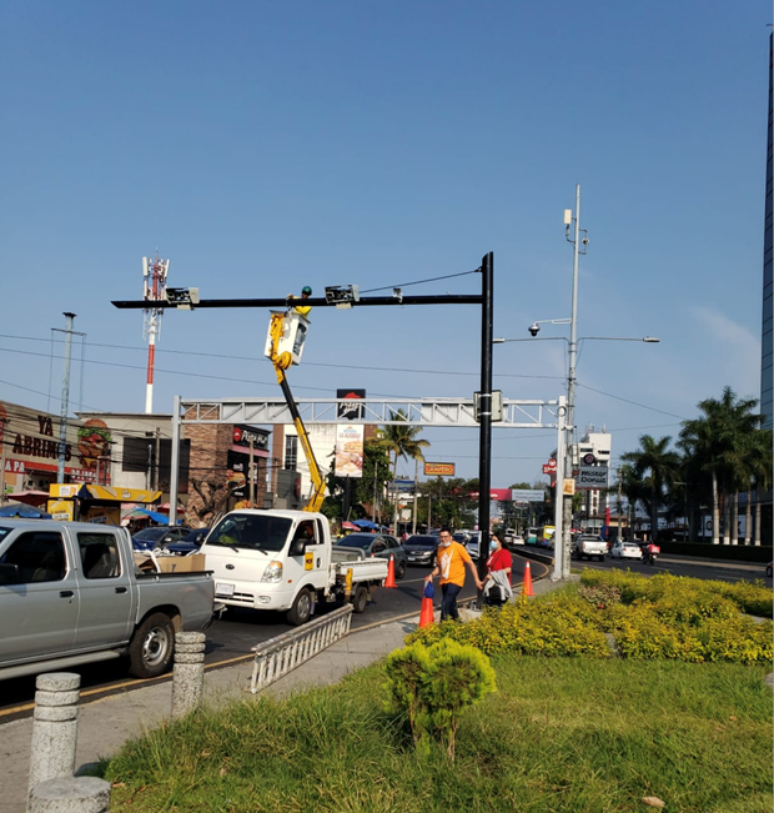The transit department of El Salvador also imported 9 WIM (Weigh In Motion) scales from Brazil to optimize truck traffic.
In El Salvador, speed control technology and the Weigh-in-motion (WIM) system for monitoring the weight of moving vehicles, manufactured in Brazil, are being implemented.
Approximately 65 Doppler radars, state-of-the-art technology to improve traffic, reduce accidents through four modules of infringement: speeding, running at a red light, stopping in the pedestrian lane and improper use of the lane.
El Salvador’s Traffic Department also imported 9 Weigh In Motion (WIM) scales from Brazil to optimize truck traffic. The equipment is part of the “Centralized and Integrated Mobility Management System in El Salvador” program.
Allied to the equipment is software for data management, intelligence and analysis, which will be integrated with transportation and security agencies. The goal is to manage all the information received from the equipment and generate reports that will contribute to the improvement of traffic engineering.
Mobility specialist Guilherme Araújo, who is also the CEO of Velsis, a Brazilian company that produces mobility technology and will be responsible for installing the systems, says the technology will help El Salvadoran authorities plan mobility for the coming decades, in addition to reducing the number of accidents and deaths in traffic, since radars are able to issue data relating to displacement, average speed, average journey time, among others.
“From the data generated by the radars, it can be demonstrated an average reduction of up to 35 times in the erratic behavior of drivers in the places where the equipment is installed,” Guilherme says.
According to him, the country is growing in terms of population and vehicle fleet, also causing more accidents. “There is an obvious relationship between the reduction in road traffic fatalities and the increase in electronic inspection. Measurement is a way to manage and enable assertive decision-making,” he adds.
Brazilian legislation will serve as a model
Furthermore, the traffic authorities in El Salvador are seeking information from the Brazilian Highway Code (CTB) so that the Brazilian rules can be adapted and implemented according to the reality of the country.
El Salvador’s network of roads and highways is 9,012 km long and the country has a population of 6.31 million. This places El Salvador 187th in the world rankings. With an average of 1,297 road traffic fatalities per year (2013-2019), road traffic in El Salvador is considered to be quite mixed. This corresponds to approximately 20.7 fatal accidents per 100,000 inhabitants per year.
In El Salvador, there is right-hand traffic on the roads, so you drive in the right lane and overtake on the left. Oncoming traffic comes towards you on the left.
Guilherme says implementing the systems in the country is challenging. “Our solution, which features the latest technology, will enable San Salvador to become the smartest city in Central America, as well as make the city safer for its population and improve traffic within the city and region underground,” says Araujo.
Overload control – Another important benefit of the system will be the overload inspection of vehicles, which will contribute to the durability of the pavement and increased safety on highways.
Velsis will be the company responsible for the installation of this traffic analysis device, which will allow for the capture of images of all vehicles passing by the point where the scale is installed.
The sensors identify the passage, speed and geometry of the vehicle on the entire stretch of road, including the lanes. Information such as vehicle data – such as color, date and model – net weight, tare weight, gross weight and serial number – can also be released, allowing the documentation to go through the Traffic Department and the Treasury Department.
With this, the bodies in charge will be able to act effectively for the identification of vehicles traveling with excess weight, with a weight different from that indicated on the invoice, the re-use of invoices for the transport of goods, expired or late documents, cloned plates and other illegality.
Website: https://velsis.com.br/
Source: Terra
Rose James is a Gossipify movie and series reviewer known for her in-depth analysis and unique perspective on the latest releases. With a background in film studies, she provides engaging and informative reviews, and keeps readers up to date with industry trends and emerging talents.






